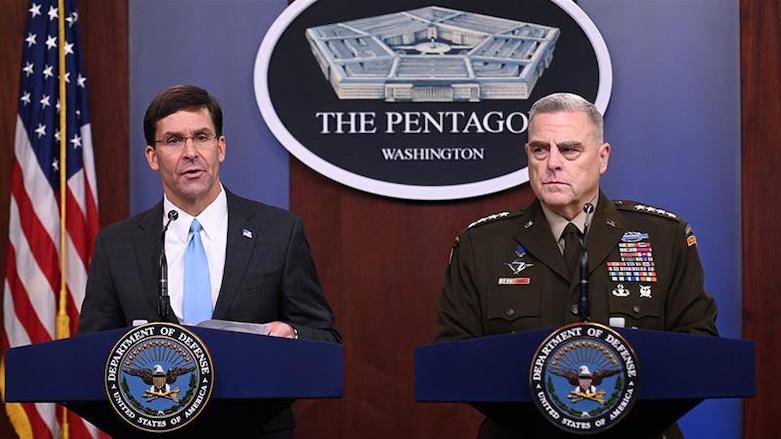Pentagon chiefs: we have no plans to leave Iraq

WASHINGTON DC (Kurdistan24) – US Secretary of Defense, Dr. Mark Esper, as well as Chairman of the Joint Chiefs of Staff, Gen. Mark Milley, told journalists late on Monday afternoon that US forces were not leaving Iraq, contrary to a letter, ostensibly from a senior US military officer to his Iraqi counterpart, which circulated widely on social media and which suggested that US forces were redeploying within Iraq, in preparation for leaving the country altogether.
“No decision whatsoever to leave Iraq”
As Esper affirmed, “There’s been no decision whatsoever to leave Iraq.” He then repeated that statement three more times. In the most categorical of his denials, Esper said, “There is no decision to leave, nor did we issue any plans to leave, or prepare to leave.”
“We are committed to the D-ISIS [Defeat-ISIS] mission in Iraq, alongside our allies and partners,” he stated.
Esper explained that he was seeing the letter for the first time, and asked, if he could confirm its authenticity, he replied, “No, I can’t.”
Subsequently, Milley told reporters that it “is a draft. It was a mistake. It was unsigned” and “should not have been released.” He added that it was “poorly worded” and implied “withdrawal,” although “that is not what’s happening.”
“In due deference to the sovereignty of the Republic of Iraq, and as requested by the Iraqi Parliament and the Prime Minister,” the letter began, “CJTF-OIR will be repositioning forces over the course of the coming days and weeks to prepare for onward movement” and “ensure that the movement out of Iraq is conducted in a safe and efficient manner.”
The letter went on to explain that there would be increased helicopter flights at night, as US forces redeployed out of the Green Zone.
Withdrawal is the Antithesis of US Policy
Col. Norvell DeAtkine (US Army, Retired), formerly Director of Middle East Studies at the John F. Kennedy Special Warfare Center and School at Fort Bragg, described the letter as “a major screw-up,” because “it contradicts what the senior US military leadership is saying.”
It is also the very opposite of US policy as articulated – rather dramatically – by President Donald Trump himself. Following Sunday’s vote in the Iraqi parliament calling for the withdrawal of foreign forces from Iraq, Trump said the US would not be leaving.
“If they do ask us to leave, if we don’t do it in a very friendly basis, we will charge them sanctions like they’ve never seen before, ever,” Trump told journalists. “It’ll make Iranian sanctions look somewhat tame.”
The parliamentary vote was non-binding, and it remains to be seen what the Iraqi government will do. However, as The Washington Post reported late on Monday, senior administration officials have begun drafting sanctions legislation against Iraq, in the event it does order the withdrawal of US forces.
Force Protection Measure? Kurdistan as a Safe Haven
Possibly, the letter was drafted in the context of enhancing the protection of Coalition forces stationed in the country, given the heightened tensions between the US and Iran.
That made sense to DeAtkine, who noted that one possibility would be to move at least some troops to the Kurdistan Region. “That would be an excellent idea,” he said.
Nicholas Heras, of the Center for a New American Security, recently suggested something similar in an opinion piece for Kurdistan 24.
Read More: No Better Friends: The US-Kurdistan Region Security Partnership
The Kurdistan Region is “a safe space for US forces,” Heras wrote, noting “they are able to launch operations against the Islamic State in both Iraq and Syria, while the Kurds of Iraq have shown themselves to be excellent local partners for US policymakers, as well as US military officers.”
Indeed, in discussing the parliamentary vote against foreign troops, Esper observed that “nearly all the Kurds did not participate in the vote.”
Editing by Karzan Sulaivany
